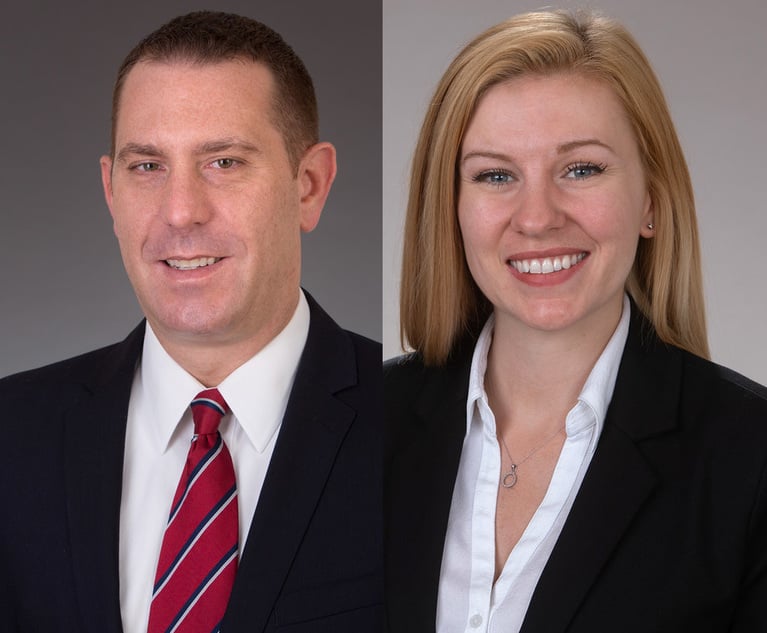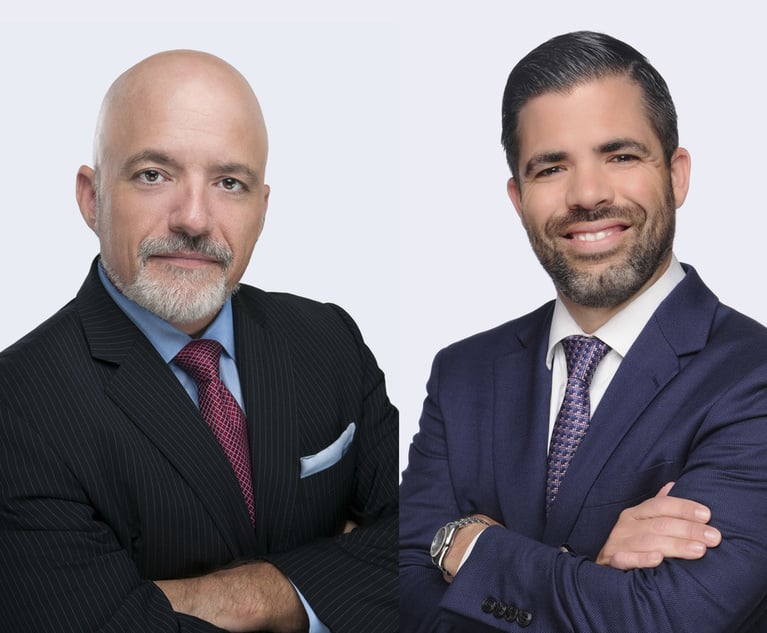'Daubert' Six Months Later—The Sky Is Not Falling
On May 23, 2019, the Florida Supreme Court, after a change in its membership, sua sponte, reversed itself and adopted the Daubert standard. Six months later, the fears of Daubert opponents have so far proven to not be true.
March 05, 2020 at 10:39 AM
5 minute read
 Joseph Goldstein, Shutts & Bowen, Ft. Lauderdale.
Joseph Goldstein, Shutts & Bowen, Ft. Lauderdale.
Nearly seven years ago, through a legislative change, Florida joined the super majority of states and the federal judiciary in adopting the Daubert standard, replacing Frye, regarding the admission of expert testimony. The Daubert era was short-lived as the Florida Supreme Court held the legislative amendments were an unconstitutional procedural change to the Rules of Evidence, and reaffirmed Frye as the appropriate standard in Florida.
On May 23, 2019, the Florida Supreme Court, after a change in its membership, sua sponte, reversed itself and adopted the Daubert standard. Six months later, the fears of Daubert opponents have so far proven to not be true.
Getting a consensus on the effect of Daubert is challenging due to the disagreement of its application. While most practitioners would contend that Daubert creates a higher barrier to the admission of expert testimony, not all agree. For example, the Florida Supreme Court has contributed to this confusion in its earlier precedent, such as Brim v. Florida, 695 So.2d 268, 271-72 (Fla. 1997), by maintaining Frye requires a higher standard of reliability than Daubert.
The effect of the differing standards is further confusing because the Frye standard only applies to expert testimony that is based on new or novel scientific techniques and admissibility depends on general acceptance of the science. Thus, in the vast majority of cases, no Frye inquiry is even necessary, such as for pure opinion testimony based on expertise, which is often preferred by plaintiffs counsel and prosecutors.
The Daubert standard, however, applies to all expert testimony and requires the trial judge to determine if it is reliable based on a multifactorial analysis. Thus, Florida opponents to Daubert, aside from the constitutional issues relating to the right to a jury trial and access to the courts, feared that Daubert would overburden the courts and impede parties' ability to prove cases on the merits due to purported more rigorous Daubert hearings.
Now, just over six months into the second Florida Daubert era, despite the fears of many, in Broward circuit courts at least, it appears that the sky is not falling. Numerous circuit court judges confirmed that while initially there may have been an increase in motion practice, they have not reported any material adverse impacts in their courts. Chief Judge Jack Tuter, of the Seventeenth Judicial Circuit of Florida, commented "although the judges had numerous hearings, we felt as a group applying Daubert had little change from Frye." Some practitioners have reported, consistent with opponents' fears, that the costs of presenting experts have increased, especially when the trial judge grants an evidentiary hearing.
Prominent medical malpractice attorney, Jay Cohen, reports that due to the limitations and hurdles in bringing a medical malpractice case, he has not seen the impact of Daubert on his cases and continues to expect the same moving forward. "There have been so many arguments with respect to Frye versus Daubert and yet in my experience and opinion it has had significantly less of an impact or affect in the medical malpractice arena." Likewise, former defense side, now the plaintiffs side, medical malpractice attorney, Jim Haliczer, of Haliczer Pettis & Schwamm, confirmed that the recent return to Daubert has not had the cost or time impact that others have feared. While he is not certain of the long-time impact, Haliczer finds that the circuit judges understand, depending on the circumstances, they do not have to conduct multi-day hearings, and although Daubert has broadened the scope of challenges, the judges are handling them more efficiently than the Frye challenges, as is consistent with state and federal precedent.
A recent first-degree murder case confirmed that an evidentiary hearing is not required for all Daubert challenges. In Larocca v. State, the appellate court affirmed the conviction on appeal, challenging the trial court's failure to conduct a Frye hearing. The court held that even though the Daubert standard now applies and no formal Frye or Daubert hearing was held, the trial court properly exercised its gatekeeping role because prior to permitting opinion testimony as the expert toxicologist discussed his education, training and experience sufficiently to satisfy the Daubert standard. Such precedent is consistent with the federal experience.
Nonetheless, moving to the Daubert standard will have a material impact in some cases as demonstrated by Kemp v. Florida, involving a conviction on five counts of vehicular manslaughter, where the move from Frye to Daubert meant the difference from a remand to hold a Frye hearing versus a remand to conduct a new trial.
As long as trial judges reasonably apply their gatekeeping role, both as to process and substance, moving Florida to the Daubert standard will enable our cases to be decided more efficiently, especially now that Florida is consistent with the federal system and the super majority of states.
Joseph M. Goldstein is the managing partner of the Fort Lauderdale office of Shutts & Bowen, where he focuses his practice on business litigation. He can be reached at [email protected].
This content has been archived. It is available through our partners, LexisNexis® and Bloomberg Law.
To view this content, please continue to their sites.
Not a Lexis Subscriber?
Subscribe Now
Not a Bloomberg Law Subscriber?
Subscribe Now
NOT FOR REPRINT
© 2025 ALM Global, LLC, All Rights Reserved. Request academic re-use from www.copyright.com. All other uses, submit a request to [email protected]. For more information visit Asset & Logo Licensing.
You Might Like
View All
Trending Issues in Florida Construction Law That Attorneys Need to Be Aware Of
6 minute read


Law Firms Mentioned
Trending Stories
- 1Gunderson Dettmer Opens Atlanta Office With 3 Partners From Morris Manning
- 2Decision of the Day: Court Holds Accident with Post Driver Was 'Bizarre Occurrence,' Dismisses Action Brought Under Labor Law §240
- 3Judge Recommends Disbarment for Attorney Who Plotted to Hack Judge's Email, Phone
- 4Two Wilkinson Stekloff Associates Among Victims of DC Plane Crash
- 5Two More Victims Alleged in New Sean Combs Sex Trafficking Indictment
Who Got The Work
J. Brugh Lower of Gibbons has entered an appearance for industrial equipment supplier Devco Corporation in a pending trademark infringement lawsuit. The suit, accusing the defendant of selling knock-off Graco products, was filed Dec. 18 in New Jersey District Court by Rivkin Radler on behalf of Graco Inc. and Graco Minnesota. The case, assigned to U.S. District Judge Zahid N. Quraishi, is 3:24-cv-11294, Graco Inc. et al v. Devco Corporation.
Who Got The Work
Rebecca Maller-Stein and Kent A. Yalowitz of Arnold & Porter Kaye Scholer have entered their appearances for Hanaco Venture Capital and its executives, Lior Prosor and David Frankel, in a pending securities lawsuit. The action, filed on Dec. 24 in New York Southern District Court by Zell, Aron & Co. on behalf of Goldeneye Advisors, accuses the defendants of negligently and fraudulently managing the plaintiff's $1 million investment. The case, assigned to U.S. District Judge Vernon S. Broderick, is 1:24-cv-09918, Goldeneye Advisors, LLC v. Hanaco Venture Capital, Ltd. et al.
Who Got The Work
Attorneys from A&O Shearman has stepped in as defense counsel for Toronto-Dominion Bank and other defendants in a pending securities class action. The suit, filed Dec. 11 in New York Southern District Court by Bleichmar Fonti & Auld, accuses the defendants of concealing the bank's 'pervasive' deficiencies in regards to its compliance with the Bank Secrecy Act and the quality of its anti-money laundering controls. The case, assigned to U.S. District Judge Arun Subramanian, is 1:24-cv-09445, Gonzalez v. The Toronto-Dominion Bank et al.
Who Got The Work
Crown Castle International, a Pennsylvania company providing shared communications infrastructure, has turned to Luke D. Wolf of Gordon Rees Scully Mansukhani to fend off a pending breach-of-contract lawsuit. The court action, filed Nov. 25 in Michigan Eastern District Court by Hooper Hathaway PC on behalf of The Town Residences LLC, accuses Crown Castle of failing to transfer approximately $30,000 in utility payments from T-Mobile in breach of a roof-top lease and assignment agreement. The case, assigned to U.S. District Judge Susan K. Declercq, is 2:24-cv-13131, The Town Residences LLC v. T-Mobile US, Inc. et al.
Who Got The Work
Wilfred P. Coronato and Daniel M. Schwartz of McCarter & English have stepped in as defense counsel to Electrolux Home Products Inc. in a pending product liability lawsuit. The court action, filed Nov. 26 in New York Eastern District Court by Poulos Lopiccolo PC and Nagel Rice LLP on behalf of David Stern, alleges that the defendant's refrigerators’ drawers and shelving repeatedly break and fall apart within months after purchase. The case, assigned to U.S. District Judge Joan M. Azrack, is 2:24-cv-08204, Stern v. Electrolux Home Products, Inc.
Featured Firms
Law Offices of Gary Martin Hays & Associates, P.C.
(470) 294-1674
Law Offices of Mark E. Salomone
(857) 444-6468
Smith & Hassler
(713) 739-1250






